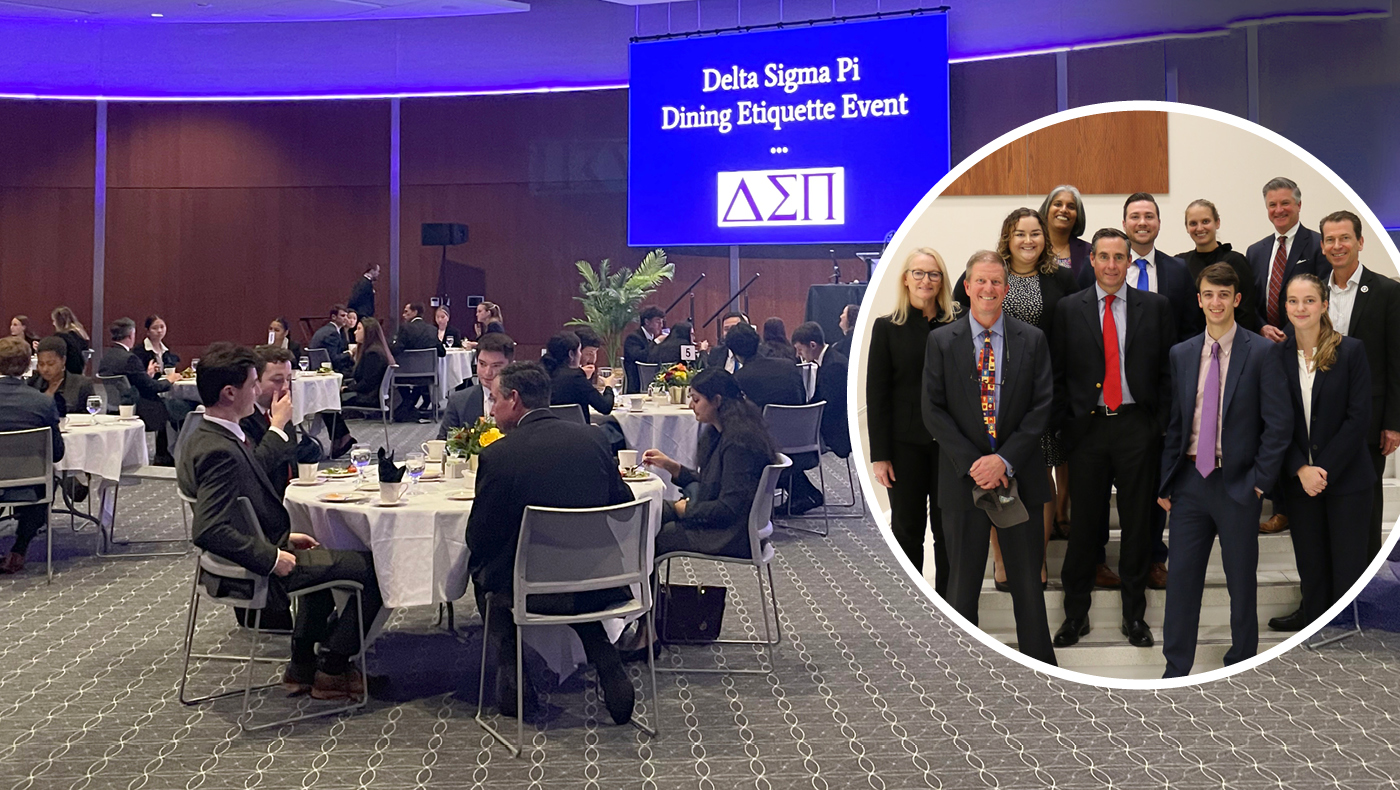Have you ever attended a formal dining event with a potential employer and felt confused about what silverware to use?
Students in Delta Sigma Pi (DSP), one of the University of Delaware Alfred Lerner College of Business and Economics’s professional business fraternities, hosted a professional dining event on November 30th to answer this question and teach its members proper dining etiquette during a three-course plated dinner at the Audion at UD’s STAR campus.
DSP is a UD student organization focused on professional development, community service and leadership as a way for students to develop personally and professionally.
Leah Walter, vice president of professional activities for DSP, pulled the event together in collaboration with Enterprise Holdings, a leading mobility solutions company worldwide, which sponsored the event.
“I wanted to teach my peers about dining etiquette and prepare them for real-life meal experiences with future employers and colleagues while fostering connections with fellow students and Lerner Faculty,” Walter shared. “I hope that after this event, students will feel more confident in carrying themselves in future business events.”
Prior to the dinner, students met with Nick Waller, dining room manager and instructor, with Vita Nova, UD’s student-run restaurant, to review best practices in dining etiquette and manners in various cultures.
Waller explained the importance of etiquette, sharing that, “Proper dining etiquette can teach people how to behave around others in a way that is welcoming and sets the stage for openness and bonhomie. Good manners make others feel comfortable and allow for positivity to flow.”
Below are the top eight etiquette tips that will leave you prepared for your next professional dinner. Whether you are a freshman or a senior or an alum, all Blue Hens can follow this list to feel confident during their next dinner party.
- Turn off your cell phone before sitting down. It is rude to talk on your phone or text while in the company of others.
- Your phone should be out of sight, too, whether that is putting it in your handbag or pocket. It should be kept off the table completely. It shows the host and others that you are present during the meal.
- Taste your food before you add salt, pepper, or other seasonings.
- Immediately adding other sauces or seasonings may be insulting to the host or hostess. Do not assume that it will be needed. You should try at least one or two bites of everything on your plate, unless you are allergic to it, of course.
- Eat slowly and pace yourself to finish at the same approximate time as the host or hostess.
- In some cultures, eating quickly is a compliment to the host. It shows that you enjoy the meal. In most cases though, pacing yourself is the better option. Take your time when you are eating, It is best to finish your last bites when everyone else does.
- If you are drinking from a stemmed glass, hold it by the stem.
- It is normal to automatically want to reach for the base of the glass but holding it by its stem is the proper way. The general rule for holding a stemmed glass is to grip the glass by the stem, pinching it between your thumb, pointer, and middle fingers. Your other fingers will naturally rest on the base of the glass.
- It is normal to automatically want to reach for the base of the glass but holding it by its stem is the proper way. The general rule for holding a stemmed glass is to grip the glass by the stem, pinching it between your thumb, pointer, and middle fingers. Your other fingers will naturally rest on the base of the glass.
- Familiarize yourself with the place settings.
- Learning the basics of place settings is a great starting point, especially for formal or professional dinners. There are slight variations, but forks typically go on the left of a plate, and the knives and spoons go on the right, with the knife closest to the plate. Always position the knife with the cutting blade pointed toward the plate.
- Keep your elbows off the table. Rest the hand you are not using in your lap.
- You are sharing the table with others, it is important to be aware of your own space so you do not infringe on others. Keep your elbows off the table and near your side or lap to ensure that your neighbors have enough personal space.
- Use your utensils for eating, not gesturing.
- Pointing your utensils at others is rude. Your cutlery should be rested on the plate between bites. When rested, place your knife on the edge of your plate at the one o’clock position with the blade turned inward. Your fork, tines up, at the four o’clock position tilted slightly to the left.
- Never blow on your food.
- There is no need to rush. If it is hot, it is better to wait a few minutes for it to cool off. Blowing on your food can be a little rude. Just be patient and allow it to cool down.




